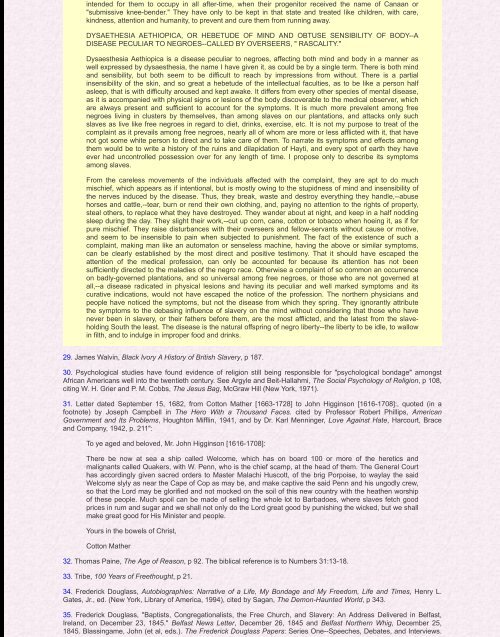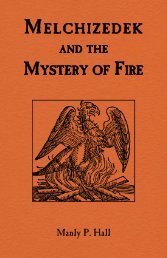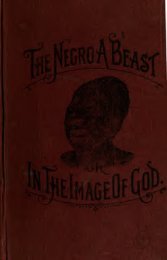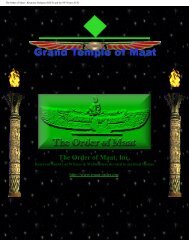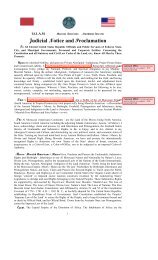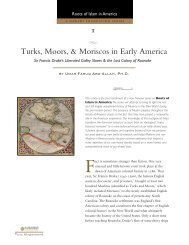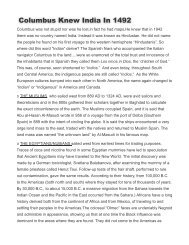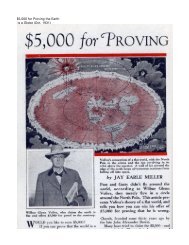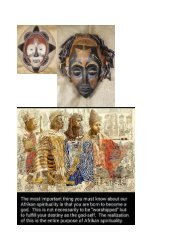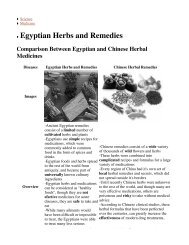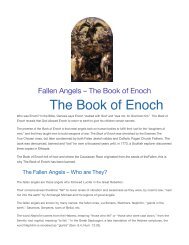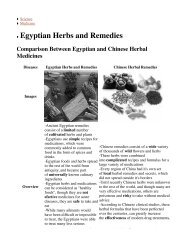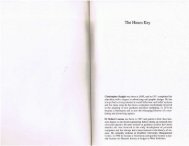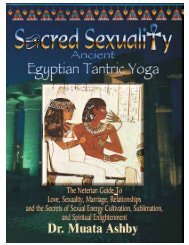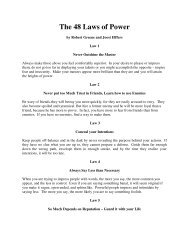Christian Slavery - Bad News About Christianity
Create successful ePaper yourself
Turn your PDF publications into a flip-book with our unique Google optimized e-Paper software.
intended for them to occupy in all after-time, when their progenitor received the name of Canaan or<br />
"submissive knee-bender." They have only to be kept in that state and treated like children, with care,<br />
kindness, attention and humanity, to prevent and cure them from running away.<br />
DYSAETHESIA AETHIOPICA, OR HEBETUDE OF MIND AND OBTUSE SENSIBILITY OF BODY--A<br />
DISEASE PECULIAR TO NEGROES--CALLED BY OVERSEERS, " RASCALITY."<br />
Dysaesthesia Aethiopica is a disease peculiar to negroes, affecting both mind and body in a manner as<br />
well expressed by dysaesthesia, the name I have given it, as could be by a single term. There is both mind<br />
and sensibility, but both seem to be difficult to reach by impressions from without. There is a partial<br />
insensibility of the skin, and so great a hebetude of the intellectual faculties, as to be like a person half<br />
asleep, that is with difficulty aroused and kept awake. It differs from every other species of mental disease,<br />
as it is accompanied with physical signs or lesions of the body discoverable to the medical observer, which<br />
are always present and sufficient to account for the symptoms. It is much more prevalent among free<br />
negroes living in clusters by themselves, than among slaves on our plantations, and attacks only such<br />
slaves as live like free negroes in regard to diet, drinks, exercise, etc. It is not my purpose to treat of the<br />
complaint as it prevails among free negroes, nearly all of whom are more or less afflicted with it, that have<br />
not got some white person to direct and to take care of them. To narrate its symptoms and effects among<br />
them would be to write a history of the ruins and dilapidation of Hayti, and every spot of earth they have<br />
ever had uncontrolled possession over for any length of time. I propose only to describe its symptoms<br />
among slaves.<br />
From the careless movements of the individuals affected with the complaint, they are apt to do much<br />
mischief, which appears as if intentional, but is mostly owing to the stupidness of mind and insensibility of<br />
the nerves induced by the disease. Thus, they break, waste and destroy everything they handle,--abuse<br />
horses and cattle,--tear, burn or rend their own clothing, and, paying no attention to the rights of property,<br />
steal others, to replace what they have destroyed. They wander about at night, and keep in a half nodding<br />
sleep during the day. They slight their work,--cut up corn, cane, cotton or tobacco when hoeing it, as if for<br />
pure mischief. They raise disturbances with their overseers and fellow-servants without cause or motive,<br />
and seem to be insensible to pain when subjected to punishment. The fact of the existence of such a<br />
complaint, making man like an automaton or senseless machine, having the above or similar symptoms,<br />
can be clearly established by the most direct and positive testimony. That it should have escaped the<br />
attention of the medical profession, can only be accounted for because its attention has not been<br />
sufficiently directed to the maladies of the negro race. Otherwise a complaint of so common an occurrence<br />
on badly-governed plantations, and so universal among free negroes, or those who are not governed at<br />
all,--a disease radicated in physical lesions and having its peculiar and well marked symptoms and its<br />
curative indications, would not have escaped the notice of the profession. The northern physicians and<br />
people have noticed the symptoms, but not the disease from which they spring. They ignorantly attribute<br />
the symptoms to the debasing influence of slavery on the mind without considering that those who have<br />
never been in slavery, or their fathers before them, are the most afflicted, and the latest from the slaveholding<br />
South the least. The disease is the natural offspring of negro liberty--the liberty to be idle, to wallow<br />
in filth, and to indulge in improper food and drinks.<br />
29. James Walvin, Black Ivory A History of British <strong>Slavery</strong>, p 187.<br />
30. Psychological studies have found evidence of religion still being responsible for "psychological bondage" amongst<br />
African Americans well into the twentieth century. See Argyle and Beit-Hallahmi, The Social Psychology of Religion, p 108,<br />
citing W. H. Grier and P. M. Cobbs, The Jesus Bag, McGraw Hill (New York, 1971).<br />
31. Letter dated September 15, 1682, from Cotton Mather [1663-1728] to John Higginson [1616-1708]:, quoted (in a<br />
footnote) by Joseph Campbell in The Hero With a Thousand Faces. cited by Professor Robert Phillips, American<br />
Government and Its Problems, Houghton Mifflin, 1941, and by Dr. Karl Menninger, Love Against Hate, Harcourt, Brace<br />
and Company, 1942, p. 211":<br />
To ye aged and beloved, Mr. John Higginson [1616-1708]:<br />
There be now at sea a ship called Welcome, which has on board 100 or more of the heretics and<br />
malignants called Quakers, with W. Penn, who is the chief scamp, at the head of them. The General Court<br />
has accordingly given sacred orders to Master Malachi Huscott, of the brig Porpoise, to waylay the said<br />
Welcome slyly as near the Cape of Cop as may be, and make captive the said Penn and his ungodly crew,<br />
so that the Lord may be glorified and not mocked on the soil of this new country with the heathen worship<br />
of these people. Much spoil can be made of selling the whole lot to Barbadoes, where slaves fetch good<br />
prices in rum and sugar and we shall not only do the Lord great good by punishing the wicked, but we shall<br />
make great good for His Minister and people.<br />
Yours in the bowels of Christ,<br />
Cotton Mather<br />
32. Thomas Paine, The Age of Reason, p 92. The biblical reference is to Numbers 31:13-18.<br />
33. Tribe, 100 Years of Freethought, p 21.<br />
34. Frederick Douglass, Autobiographies: Narrative of a Life, My Bondage and My Freedom, Life and Times, Henry L.<br />
Gates, Jr., ed. (New York, Library of America, 1994), cited by Sagan, The Demon-Haunted World, p 343.<br />
35. Frederick Douglass, "Baptists, Congregationalists, the Free Church, and <strong>Slavery</strong>: An Address Delivered in Belfast,<br />
Ireland, on December 23, 1845." Belfast <strong>News</strong> Letter, December 26, 1845 and Belfast Northern Whig, December 25,<br />
1845. Blassingame, John (et al, eds.). The Frederick Douglass Papers: Series One--Speeches, Debates, and Interviews.


